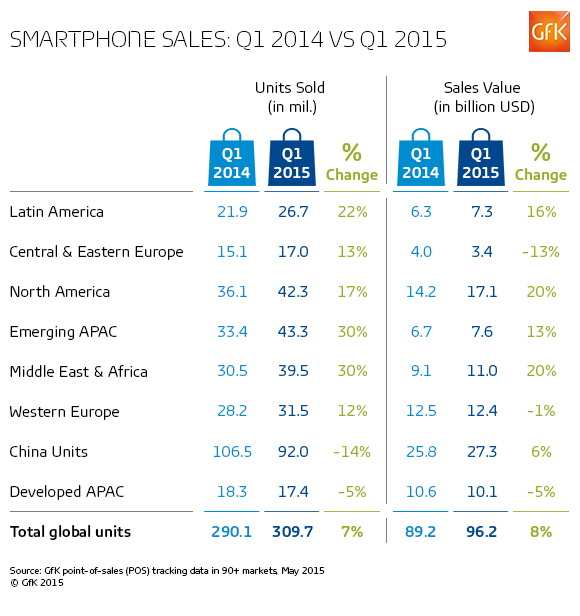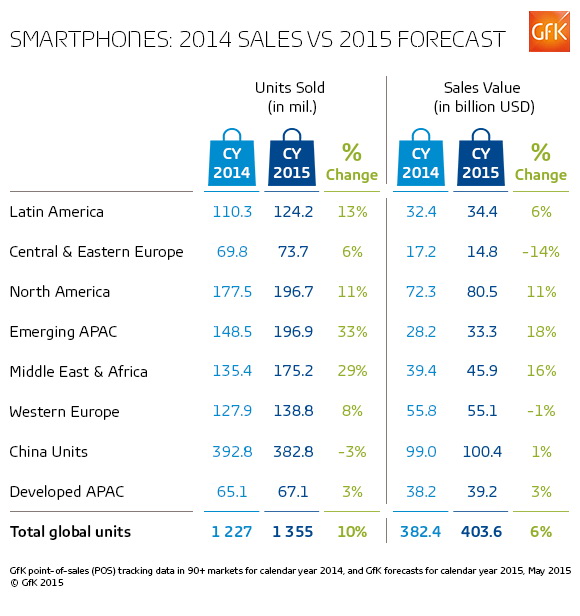In the first quarter of 2015, global smartphone unit demand increased +7 percent, compared to the same period last year. Sales reached 310m units, with growth down from +19 percent year-on-year in Q4 2014.
This slowdown was caused by a year-on-year decline in demand for smartphones in China and Developed Asia, down -14 percent and -5 percent, respectively.

Smartphone sales value in Western Europe declined on a year-on-year basis for the first time in Q1 2015, dragged down by Spain and France. As smartphone penetration nears saturation point, both countries are expected to see a slowdown in smartphone unit growth this year compared to 2014.
In Central Europe, the macroeconomic situation in Russia has significantly impacted sales. As a result, GfK forecasts that 2015 smartphone demand in the region will grow more slowly than Western Europe for the first time since 2010.

Kevin Walsh, director of trends and forecasting at GfK comments, “The weakness in China was caused by a significant slowdown in 3G demand, which was not offset by 4G growth. We forecast China to return to growth in the second half of the year, driven by a continued 4G ramp-up. In Developed Asia, the year-on-year decline was caused by tough comparisons with Q1 2014, when demand was pulled forward in Japan due to an upcoming VAT increase in April. We forecast unit demand in Developed Asia to grow by +3 percent year-on-year in 2015, driven by Japan and South Korea, which are expected to return to growth in 2Q15.”
The 4G ramp-up
In Q1 2015, 4G unit share surpassed 50 percent of global smartphone demand for the first time. China saw the greatest 4G share increase in the quarter – up 16 percentage points to 73 percent, from 57 percent last quarter. Growth has been buoyed by the continued price erosion of 4G smartphones. GfK forecasts global 4G share to increase further in 2015, reaching 59 percent in Q4 2015.
Smartphone growth in India and Indonesia is also expected to be helped by an expanding 4G network. In Q1 2015, 4G share in both countries was well below the global average, at 4 percent and 7 percent, respectively. GfK forecasts 4G unit share within smartphones to reach 7 percent in India and 10 percent in Indonesia in 2015.
Supersize smartphone screens
Q1 2015 saw a continued shift towards larger screen sizes (5”+), where sales of 166m units equated to 47 percent of the global smartphone market, up from 32 percent in Q1 2014. Share of large screen devices in N. America hit 70 percent in the quarter, up from 59 percent in the same period last year, driven by strong demand for high-end models. By comparison, in China, where the trend is particularly pronounced, the growth in share to 57 percent – from 32 percent in Q1 2014 – was driven by cheaper large screen models flooding into the market. GfK forecasts this screen size migration to continue in 2015, with global demand for large screen devices increasing by +30 percent year-on-year to account for 69 percent of total smartphone unit demand this year.
Price Band dynamics in Q1 2015
Low-end smartphones – those priced in the region of $0-250 – increased share to 56 percent, up from 52 percent in Q4 2014, at the expense of the high-end models ($500+), whilst mid-range ($250-500) share remained stable. GfK forecasts low-end smartphones to gain further share in 2015, helped by continued price erosion in emerging markets.
The outlook for 2015
Walsh continues: “GfK forecasts global smartphone unit demand to grow +10 percent year-on-year in 2015, a slowdown from the +23 percent growth experienced last year. Emerging Asia is forecast to be the fastest growing region, driven by India and Indonesia, where low smartphone penetration leaves plenty of room for growth.”

